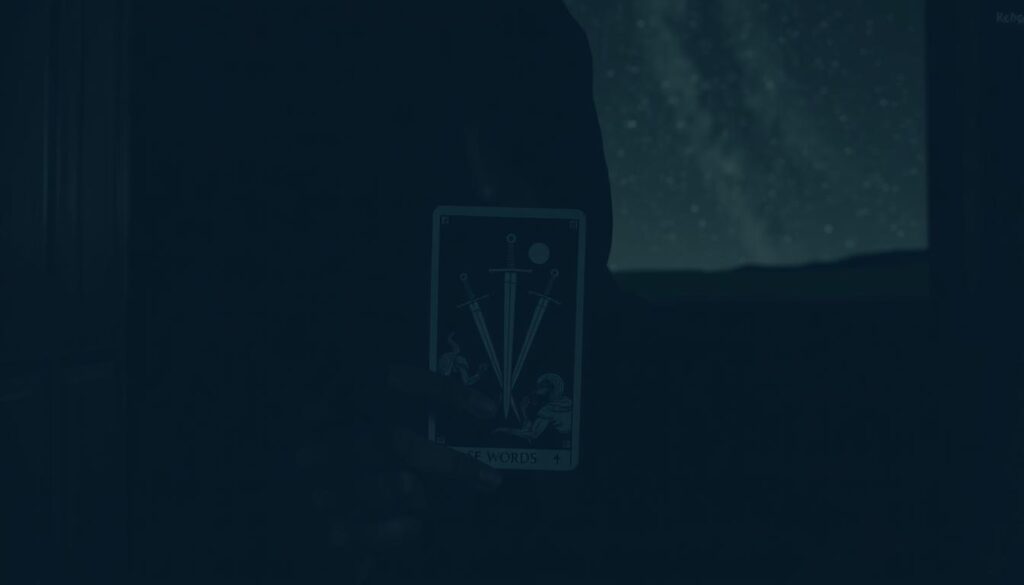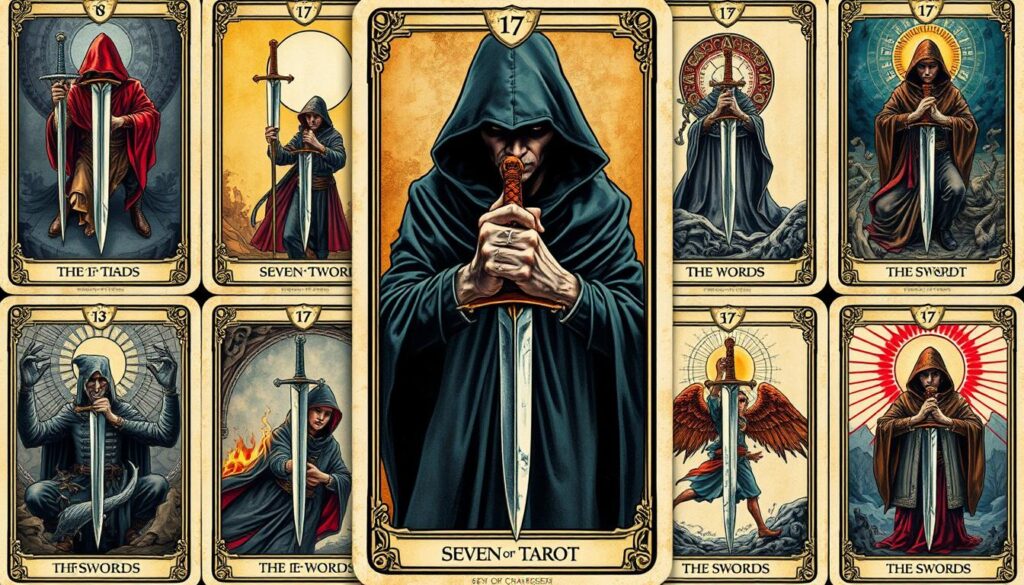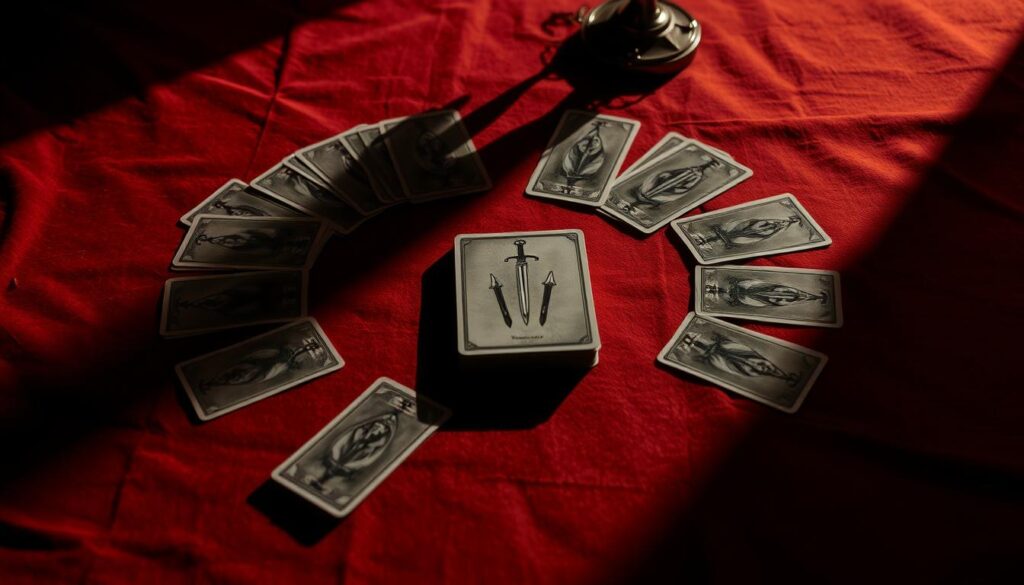The Seven of Swords is one of the most intriguing cards in the tarot deck. It shows a figure sneaking away with stolen swords, leaving two behind. This imagery hints at strategy, deception, and tough choices.
In readings, this card often signals a need for clever thinking. It can represent quick-witted moves, but also warns of dishonesty. Whether upright or reversed, its meaning shifts between resourcefulness and regret.
Real-life situations—like workplace conflicts or trust issues—mirror the card’s themes. Understanding its lessons helps navigate tricky scenarios with wisdom. This article explores how to use its insights ethically.
Key Takeaways
- The Seven of Swords symbolizes strategy and stealth.
- Its imagery reflects deception and possible consequences.
- Upright, it suggests clever solutions; reversed, it warns of guilt.
- Connects to real-world challenges like trust and competition.
- Encourages ethical decision-making in tough situations.
Introduction to the Seven of Swords
Stealth and strategy take center stage in this intriguing tarot card. Historically, it symbolized trickery—think of folklore’s clever foxes or wartime spies. Yet, its lessons stretch beyond deceit. The Seven of Swords challenges us to weigh motives against consequences.

Today, the card mirrors modern dilemmas. Workplace politics, negotiation tactics, or even setting personal boundaries require its nuanced energy. As one tarot expert notes:
“Deception isn’t always malicious. Sometimes, it’s survival.”
Consider these two approaches:
| Ethical Shortcut | Harmful Exploitation |
|---|---|
| Exiting a toxic friendship quietly | Spreading rumors to gain advantage |
| Protecting privacy at work | Stealing credit for others’ ideas |
Avoiding confrontation isn’t cowardice—it’s wisdom. The card’s imagery (five swords taken, two left behind) hints at imperfect solutions. Later sections explore upright and reversed meanings in love, career, and finances.
The Seven of Swords: Core Meaning and Symbolism
Hidden motives and sharp wit lie at the heart of this symbol. The card’s artwork—a figure tiptoeing with five blades while two remain—hints at incomplete victories. Every detail, from the tense posture to the distant tents, speaks to calculated risk.

Visual Elements and Their Interpretations
The stolen swords reversed in the figure’s grip suggest secrecy. Yet the abandoned pair implies consequences. Psychologists link this to imposter syndrome—outward confidence masking inner doubt.
Colors matter too. Pale skies signal fleeting success, while earthy tones ground the deception in reality. As one reader noted:
“It’s not just about taking—it’s about what you leave behind.”
Upright vs. Reversed: A Dual Perspective
Upright, this card rewards clever tactics. Imagine negotiating a raise without burning bridges. But reversed, it exposes lies—like falsifying credentials. The shift from strategy to guilt is stark.
Key contrasts:
- Upright: Independence, quick thinking
- Reversed: Accountability, fear-driven choices
Both positions ask: Is self-interest crossing into harm? The answer often lies in your feelings—guilt versus pride.
Upright Seven of Swords: Strategy and Deception
Sometimes, the smartest move is the quietest one. The upright Seven of Swords celebrates strategic thinking—whether avoiding conflict or reclaiming power. But when does resourcefulness tip into sneakiness?

When Resourcefulness Becomes Sneakiness
Healthy strategy protects your self-interest without harming others. For example, quietly leaving a toxic job avoids drama. But manipulating coworkers crosses the line.
Ask yourself:
- Is this a need or a want?
- Am I leaving collateral damage?
Escaping Unhealthy Situations
Toxic relationships or workplaces often demand stealthy exits. Ghosting an abusive partner, for instance, prioritizes safety over confrontation. Yet, honesty where possible builds integrity.
| Ethical Exit | Unethical Escape |
|---|---|
| Giving minimal notice to avoid retaliation | Sabotaging projects before quitting |
| Setting boundaries without explanation | Spreading lies to justify leaving |
“Not-enoughness drives us to hide. Courage lets us walk away clean.”
Affirmations for ethical courage:
- “I need no tricks to protect my peace.”
- “There’s always a way out with dignity.”
Seven of Swords in Love: Upright Meaning
Navigating relationships requires both wisdom and caution. In love, this card warns of hidden agendas while rewarding strategic self-protection. It’s not about games—it’s about guarding your heart without losing authenticity.

Dishonesty and Trust Issues
When trust shatters, the Seven of Swords often appears. A client once drew this card after realizing her partner gaslit her for years. Her quiet exit—blocking him and moving—was the ultimate way to reclaim power.
Compare these approaches:
| Healthy Boundaries | Toxic Secrecy |
|---|---|
| Taking space to heal | Lying to “test” a partner |
| Slowly rebuilding trust | Withholding affection as punishment |
Protecting Your Heart Strategically
Journal prompts can align actions with values:
- “What red flags did I ignore?”
- “How can I set boundaries without guilt?”
“Deception leaves scars, but honesty heals.”
Reversed (explored in Section 9), this card promises reconciliation—if both parties choose transparency.
Seven of Swords in Career: Upright Meaning
Career challenges often demand clever solutions—this card reveals them. In professional settings, its energy rewards strategic thinking while cautioning against deceit. Whether navigating office politics or outmaneuvering competition, the upright position highlights the power of a well-timed move.

Workplace Sabotage and Gossip
Not all work environments are fair. The card’s imagery—a figure slipping away—mirrors toxic dynamics like stolen credit or whispered rumors. But it also teaches defense: documenting contributions, avoiding gossip traps, and trusting intuition when something feels “off.”
“Desire for advancement shouldn’t trample integrity. True success leaves no casualties.”
Tactical Approaches to Challenges
Apply the 80-20 rule: focus on high-impact tasks where your niche skills shine. A graphic designer might prioritize branding projects over generic edits, for example. This leverages uniqueness without underhanded tactics.
Ethical red flags to avoid:
- Lying on resumes (shortcuts backfire)
- Isolating teammates (collaboration breeds longevity)
- Burning bridges (exit with grace)
For deeper clarity, try a tarot spread (Section 16) to weigh risks versus rewards. Every opportunity carries consequences—choose the way that aligns with your values.
Seven of Swords in Finances: Upright Meaning
Financial decisions often test our wisdom—this card reveals when to act and when to step back. The upright Seven of Swords warns of scams but also rewards smart self-protection. Whether guarding savings or navigating investments, its energy highlights strategy over impulsivity.

Risky Schemes and Scams
Fraudsters thrive on haste. This card urges you to pause before sharing bank details or clicking “urgent” payment links. A client once avoided a phishing scam by cross-checking the sender’s email—a modern way to wield the card’s caution.
Red flags:
- Too-good-to-be-true returns
- Pressure to decide immediately
- Requests for sensitive data via text
Protecting Your Resources
Budgeting mirrors the card’s imagery—holding some resources tight while letting go of wasteful spending. Freezing credit, enabling two-factor authentication, and verifying invoices are proactive shields.
| Risky Move | Strategic Alternative |
|---|---|
| Investing in unverified “hot tips” | Researching through SEC filings |
| Ignoring small recurring charges | Auditing subscriptions monthly |
“Fear makes us hoard; wisdom lets us grow.”
For those burned by identity theft (like a survivor who rebuilt credit with secured cards), the reversed card’s promise of stability (Section 11) offers hope. Every choice either drains or defends your money—choose the need-aligned path.
Reversed Seven of Swords: Truth and Consequences
When this card appears reversed, it signals a turning point. The sneaky energy shifts toward accountability. Hidden truths surface, and actions once justified now demand honesty.

Confession and Accountability
Facing past deceit takes courage. A marketing director once admitted faking metrics—costing her job but freeing her self-worth. Therapy helped her rebuild trust with her team.
Common scenarios requiring amends:
- Quitting a manipulative sales job that pressured lies
- Ending emotional blackmail in relationships
- Correcting false claims on resumes
“Guilt weighs more than the consequences. Truth lifts both.”
Changing Unethical Tactics
Imposter syndrome often fuels sneaky behavior. One study found 70% of professionals doubted their skills, leading to exaggerated claims. Mentorship can break this cycle by validating real abilities.
| Old Pattern | New Approach |
|---|---|
| Taking credit for team ideas | Publicly acknowledging collaborators |
| Lying to avoid conflict | Practicing assertive communication |
Section 14 explores how fear drives these choices. For now, ask: Does this way of working align with who I need to become? The answer guides ethical growth.
Reversed Seven of Swords in Love
Love demands honesty, and the reversed position of this card delivers it. Where the upright version hinted at stealth, the reversed one reveals hidden truths. This shift invites healing—if both partners choose courage over fear.

Lies Revealed and Healing
Secrets poison relationships. A client once hid her anxiety to please her partner—until the reversed card appeared. Therapy helped her voice her feelings, transforming their dynamic.
Try these steps to rebuild trust:
- Journal to untangle suppressed emotions
- Practice radical honesty in small doses
- Seek couples’ therapy for guided conversations
“Perfection is a prison. Love thrives in raw, messy truth.”
Dropping Emotional Armor
The myth of not-enoughness fuels walls. One dater confessed faking interests to seem “ideal.” Letting go of that desire freed her to attract authentic connections.
Healthy vulnerability looks like:
| Old Pattern | New Approach |
|---|---|
| Silencing needs to avoid conflict | Asserting boundaries kindly |
| Pretending to agree | Respecting differences |
Your heart learns safety isn’t in hiding—it’s in choosing a way that honors your self.
Reversed Seven of Swords in Career
Truth has a way of surfacing, especially in professional settings. The reversed position exposes hidden dishonesty—whether stolen credit, inflated metrics, or broken promises. It’s a wake-up call to align actions with integrity.

Exposing Workplace Deceit
Toxic work cultures often breed secrecy. A sales manager once falsified client numbers to meet quotas. When caught, she chose transparency—apologizing to her team and revising reports. Her honesty, though painful, rebuilt credibility.
Steps to address deceit:
- Document discrepancies (emails, records).
- Publicly correct misinformation.
- Seek mentorship to avoid future lapses.
“Shortcuts may boost ego, but integrity builds legacies.”
Rebuilding Professional Integrity
Imposter syndrome drives many to exaggerate skills. Combat this by:
| Old Habit | New Approach |
|---|---|
| Claiming others’ ideas | Crediting collaborators in meetings |
| Hiding mistakes | Reporting errors with solutions |
Ask before decisions: “Does this align with my self-worth?” Every ethical choice is an opportunity to grow. For deeper reflection, compare deck interpretations (Section 15).
Reversed Seven of Swords in Finances
Financial honesty often comes with tough lessons—this reversed card reveals them. Whether it’s hidden debt or unethical investments, the energy shifts from secrecy to accountability. Here’s how to navigate the fallout and rebuild.

Consequences of Financial Dishonesty
Scams and shortcuts eventually unravel. A client once hid credit card debt from their partner until the reversed card appeared in a reading. The confrontation was painful, but it sparked a joint plan to repay and rebuild trust.
Red flags to confront:
- Unexplained withdrawals or hidden accounts
- Pressure to invest in “guaranteed” schemes
- Faking income on loan applications
“Money secrets grow in the dark. Bring them to light, and they lose power.”
Restoring Stability
Start with transparency. Create a debt repayment plan or attend financial literacy workshops. One woman left a multi-level marketing scheme after realizing its predatory nature—freeing her resources for ethical ventures.
Steps to rebuild:
| Past Mistake | Ethical Way Forward |
|---|---|
| Ignoring overdue bills | Negotiating payment plans with creditors |
| Impulse spending | Using cash envelopes for budgeting |
Gratitude practices combat scarcity mindsets. List three financial wins weekly—even small ones like saving $10. This aligns with Section 13’s theme: ethical choices honor your self-worth.
The Seven of Swords and Imposter Syndrome
That nagging voice whispering “you don’t belong here” has a name—and a solution. Imposter syndrome makes even high achievers doubt their skills despite clear evidence of success. The reversed Seven of Swords mirrors this inner conflict, where self-deception replaces stolen swords with stolen confidence.

Self-Deception vs. Self-Awareness
A marketing director once confessed feeling like a fraud after her promotion. Though her work metrics were stellar, she feared being “exposed.” This card’s energy—when reversed—exposes such hidden feelings.
Root causes include:
- Desire for perfection (“If I’m not flawless, I’ve failed”)
- Comparing your behind-the-scenes to others’ highlight reels
- Cultural myths tying worth solely to productivity
“Not-enoughness is a thief. It steals joy first, then credibility.”
Breaking the Cycle
Affirmations rewire thought patterns. Try:
| Negative Belief | Empowering Alternative |
|---|---|
| “I got lucky” | “I earned this through skill and effort” |
| “They’ll find out I’m not smart” | “My unique perspective adds value” |
Mentorship is another way forward. A study found 85% of professionals with mentors reported higher self-assurance. Their external validation became internal confidence.
Strategic Thinking: When to Use the Seven of Swords’ Energy
Strategic thinking isn’t about deception—it’s about smart self-preservation. This card’s energy rewards clever solutions but demands ethical checks. Whether setting boundaries or navigating tough situations, its lessons hinge on balance.
Ethical Shortcuts vs. Exploitation
Avoiding conflict isn’t cowardice. For example, declining extra work to protect mental health honors your need for rest. But lying to sabotage a colleague crosses into harm.

- Ethical: Skipping a work trip to attend your child’s recital.
- Exploitative: Faking illness to avoid responsibilities.
“Self-trust is the compass. If guilt follows an action, rethink it.”
Prioritizing Your Needs Without Harm
Martyrdom helps no one. A client once ignored burnout to please her boss—until panic attacks forced change. She learned to say no without guilt, a healthier way forward.
Ask yourself:
- Does this align with my core desire?
- Am I sacrificing integrity for approval?
For deeper clarity, try Section 16’s tarot spread. Every choice should protect your peace—not steal others’.
Myth of Not-Enoughness: Psychological Insights
Many people carry an invisible burden—the belief they’re fundamentally lacking. This deep-seated fear often drives behaviors mirroring the Seven of Swords, where deception becomes a misguided survival tactic. Understanding these psychological roots helps break destructive patterns.

How Fear Drives Deceptive Behavior
Childhood experiences shape our core feelings of worth. A client who shoplifted luxury items later realized it stemmed from her father’s constant criticism. She’d internalized: “If I don’t take, I won’t have enough.”
Cognitive Behavioral Therapy (CBT) techniques can reframe these thoughts:
- Challenge: “I must appear perfect to be valued.” → “My self-worth isn’t tied to performance.”
- Evidence: List past successes contradicting the fear.
- Experiment: Share a small vulnerability—notice the world doesn’t end.
“Scarcity mindsets make us hoard love, opportunities, even compliments. Abundance says: There’s always another way.”
The book Rewilding the Tarot connects this card to societal pressures. It suggests nature as a mirror—trees don’t compete for sunlight; they grow toward it. Similarly, embracing your unique path reduces the desire to manipulate.
Case Studies: From Lack to Liberation
A former executive lied about his credentials for years. Therapy revealed his immigrant parents’ trauma—”never enough” became his life mantra. Through group support, he learned:
| Fear-Based Action | Healing Alternative |
|---|---|
| Faking expertise | Taking courses to fill skill gaps |
| Isolating from peers | Joining a mentorship program |
For deep-seated fears, therapy offers tailored strategies. EMDR helps reprocess traumatic memories, while DBT builds emotional regulation. Both align with the reversed card’s theme—replacing secrecy with self-acceptance.
Comparing the Seven of Swords Across Tarot Decks
Modern decks transform traditional meanings with fresh visual storytelling. Each artist’s expression reshapes the card’s themes—from deception to self-discovery. These variations offer nuanced ways to apply its lessons.

Classic vs. Contemporary Imagery
The Rider-Waite’s thief sneaking past tents symbolizes external deceit. Contrast this with The Wild Unknown’s fox—a creature embodying cunning survival. Both cards explore strategy but through different lenses.
Trauma-informed decks take it further. One reinterprets the figure as someone hiding their true self, linking to tarot’s role in healing. As a creator noted:
“Rebellion isn’t always theft. Sometimes, it’s reclaiming what was stolen from you.”
Cultural and Identity Perspectives
LGBTQ+-inclusive decks frame the swords as societal expectations. The “closeted” version shows blades as oppressive labels, while the “out” card depicts broken chains. This shift empowers marginalized readings.
Recommended decks for specific needs:
- Shadowscapes: Ideal for artists, with ethereal watercolor symbolism
- Modern Witch: Recasts the thief as a corporate whistleblower
- Neon Moon: Uses cyberpunk aesthetics to critique surveillance culture
Imagery changes how readers connect. A minimalist deck might highlight isolation, while a colorful one suggests playful mischief. Choose the way that resonates with your journey.
Practical Tarot Spreads for the Seven of Swords
Tarot spreads can reveal hidden layers in complex situations. When working with this card’s energy, a focused layout helps distinguish clever strategy from harmful deception. Try this method during confusing moments or when trust feels shaky.

Three-Card Spread for Clarity
This simple yet powerful reading exposes underlying dynamics:
- Hidden Motive: What’s driving the situation? (Often the 7 of Swords appears here)
- Impact: Consequences if current path continues
- Ethical Path: Alternative way forward with integrity
Sample questions for each position:
- “What fear might be clouding my judgment?”
- “Who benefits most from secrecy here?”
- “What opportunity exists if I choose transparency?”
Journaling After the Reading
Reflection deepens insights. Note:
- Physical reactions during the reading (tight chest? relief?)
- Patterns across multiple spreads
- One small action toward ethical resolution
“Cards mirror what we already sense but haven’t voiced. The real magic happens when we act on that wisdom.”
Pro tip: Revisit this spread during Mercury retrograde. Communication gaps often surface then, making it ideal for reassessing motives. Keep your deck handy—truth rarely waits for perfect timing.
Conclusion: Embracing the Seven of Swords’ Lessons
Every choice shapes your path—this card reminds us to choose wisely. The Seven of Swords teaches balance: cleverness without cruelty, strategy without harm. Whether in love, work, or life, its lessons urge us to weigh actions against integrity.
Reflect on your own “swords.” Are they burdens or tools? Use them to protect your heart, not to wound others. Every challenge has an ethical way forward—seek it.
Ready to dig deeper? Explore how The Chariot and Justice cards complement these themes. Or try a tarot app for daily guidance. Above all, remember: Wield your swords wisely.

